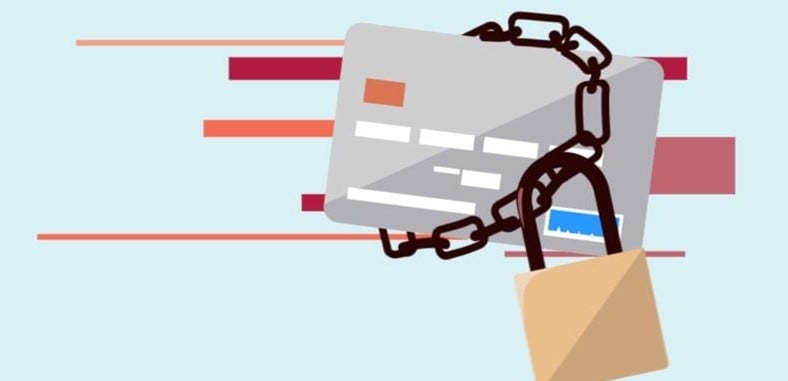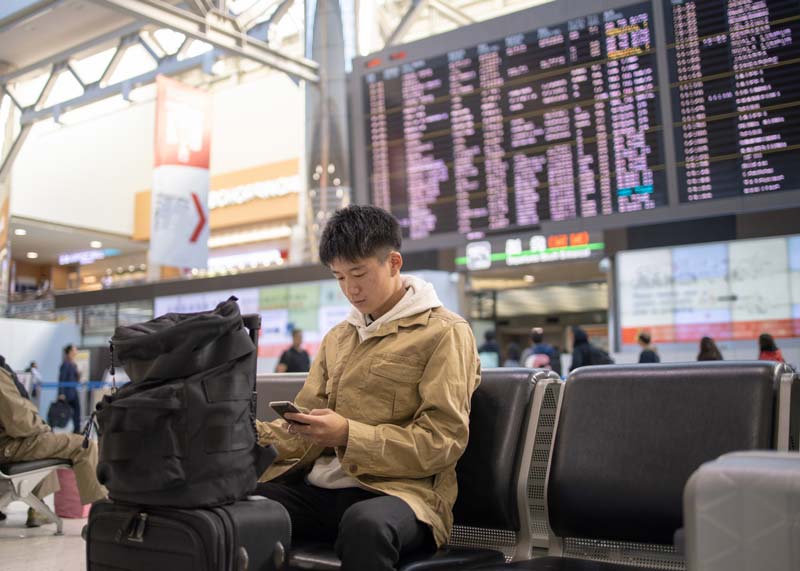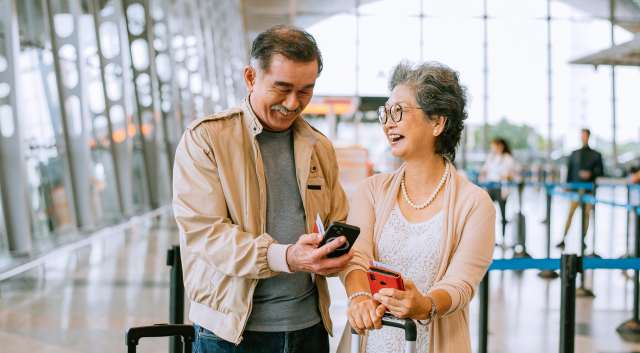Wi-Fi Travel Security Tips: Stay Secure at Hotels, Airports and More

These days, Wi-Fi is more than a perk when you travel – it’s a necessity. However, Wi-Fi comes with a number of unseen risks that could put you, your data, and identity at risk from thieves and hackers.
This is especially true when it comes to family travel, where everyone has a device and the first thing they do when they toss down their bags in the hotel room is hunt for the Wi-Fi password. And while you may take the right steps to make sure your connection is secure, does your 13-year-old?
Wi-fi Tip #1
With that in mind, here’s the first tip for Wi-Fi Safety: Don’t connect with a hotel Wi-Fi network just because it says “hotel” and looks like the hotel’s network. Don’t assume; instead, verify the name of the network with the hotel or vacation rental.

It’s not all about the network, though. Sometimes it’s your device. It may have out-of-date security patches and protections.
Also read: Travelers are More Concerned by ID Theft than Illness or Injury
Wi-fi Tip #2
So, the second tip for Wi-Fi Safety is pretty simple: Make sure you have up-to-date personal firewall and security software for all your devices. Don’t ignore the automatic updates, and if your operating system doesn’t issue automatic updates, make sure your device’s security system is updated before you leave.
Travel protection that can help with identity theft? That’s right!
You won't find ID Theft Resolution services like ours included with many travel protection plans, but at Generali we know how important identity security is for you to travel happy and travel safe.
Read more
Travel protection that can help with identity theft? That’s right!
You won't find ID Theft Resolution services like ours included with many travel protection plans, but at Generali we know how important identity security is for you to travel happy and travel safe. Read more

However, even with firewall patches, you may be susceptible to Wi-Fi-based ID theft because it’s hard to spot the difference between a fake Wi-Fi spot and the real deal. ID thieves go to a lot of trouble to make their network look legit. They use state-of-the-art equipment to make their signal the strongest available – so strong that your devices may connect to it automatically.
Yes, it’s a heck of a world where a thief’s Wi-Fi network is stronger than the one offered by your hotel, but think of what the thief stands to gain versus the hotel. One’s a convenience; the other’s a livelihood – and livelihood is a strong motivator.
At this point, if you’re asked for a credit card or personal information, you should get a clear picture that your network is a scam or malware. Phishing schemes work much the same way, with the added benefit (for the phisher) of being able to phish on the go, from a laptop or mobile phone.

Schemes like this work best with a large population base, so be particularly careful in airports and at conferences. Consider using an app like SEP, which helps differentiate between legitimate and suspicious networks.
Here are more tips to help you avoid becoming a victim of Wi-Fi scams and thefts:
Keep it basic up in the air
One of the places where you’re most susceptible to Wi-Fi-based attacks is when you’re flying.
It makes sense: There are a lot of people on an airplane, all with electronic devices and time on their hands. If presented with a free-Wi-Fi option, a person is likely to connect without thinking twice about whether it’s secure.
Especially when flying, it’s important to connect to the airline’s network and avoid any activity that would require you to enter personal information like credit card or Social Security numbers.
Look twice before connecting, stick to basic surfing, and you’ll likely be fine.
Also read: How Travel Insurance Can Help When You Fly

Pay to play
At locations where you plan to be active on the internet, ask whether they have a connection option that’s more secure than the free Wi-Fi. Even if the option costs you money, if it’s truly secure, it’s money well spent.
Don't Fall for Travel Scams: Essential Guide to Protect Yourself
Be careful with hotspots
Avoid using hotspots, like those at hotels, where you can’t tell who is connected.
If you have no other choice but to use a hotspot, stick to surfing, and avoid email, messaging, or transactions that require account numbers or passwords.
Disable automatic connections
Your devices may connect automatically to an unsecure, open network that you may not have wanted to join. Think of your device as a teenager, and the unsecure network as that one person you specifically told your child to stay away from.
To maintain the greatest level of control over your devices and their connections, disable the automatic connection function on your devices.
Also read: How Travel Insurance Works in Real Life

Make sure the site is secure
Before entering bank information or a Social Security Number, make sure the website or payment gateway has a URL that starts with “HTTPS.” The “S” in the URL means that it’s a secure protocol and data is appropriately encrypted.
Use a VPN
When you use a virtual public network (VPN), you’re basically sending and receiving information through an encrypted “tunnel,” making it extremely difficult to decipher or intercept.
All VPNs are not alike. Consider things like:
- The level and type of encryption
- Data caps
- Speed
- Cost
- Support for all devices
Read reviews and choose your VPN carefully. While sometimes it’s nice to give the little guy a try, with something as important as a VPN it may not be the best option.
Also read: How to Keep Your Bags and Valuables Safe While Traveling
Get travel insurance with ID theft protection
As it gets harder to protect your identity and data when you travel, it’s important to choose travel protection that can help with ID theft. That’s exactly what you get with Generali. There are six different ways we can help you if you encounter identity theft on your trip, including our ID Theft Resolution Services.
A safe, stable, secure Wi-Fi connection is essential for the modern traveler. Get a Generali quote today and help protect yourself when you connect.
Travel Resources
See AllB000072206


